Tuấn Lê’s “Mad at Him, Angry at Her” (“Hờn anh giận em,” 1970?) is a clever duet about a soldier and his wife in the Republic of Vietnam (RVN, or South Vietnam). The song speaks to the burden that war imposed on soldiers and their romantic partners. “Mad at Him, Angry at Her” is the fifteenth track on Saigon Rock & Soul, and this post is a continuation of my mini-series translating the lyrics from that CD. The CD translates the song’s title as “Jealousy,” but I prefer a translation that is closer to the original.
“Mad at Him, Angry at Her” is written as a lover’s quarrel that erupts the moment the soldier returns home on leave. His wife sulks instead of welcoming him home, and the frustrated husband prods her for an explanation. She then proceeds to complain about his long absence and angrily warns him not to cheat on her. He insists that he has a patriotic duty to serve in the war but promises that they will reunite for good when peace comes. By the end of the song, both sides admit that they quarrel about his absence only because they love each other and resolve to make the most of his two-week leave.
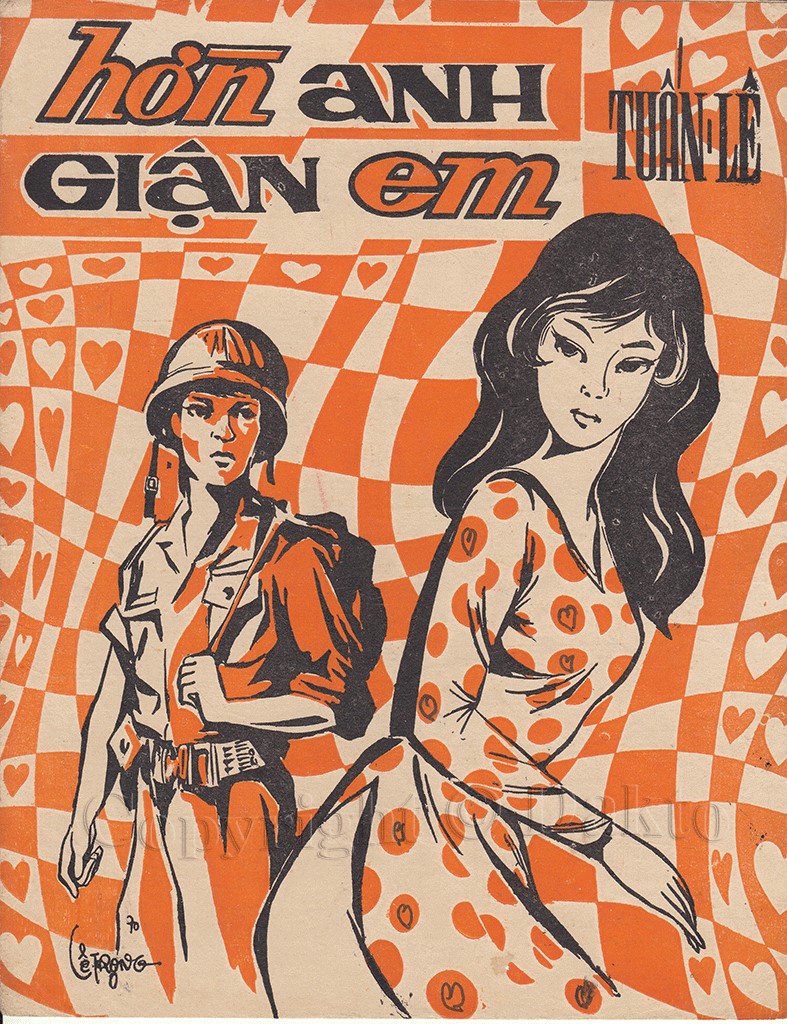
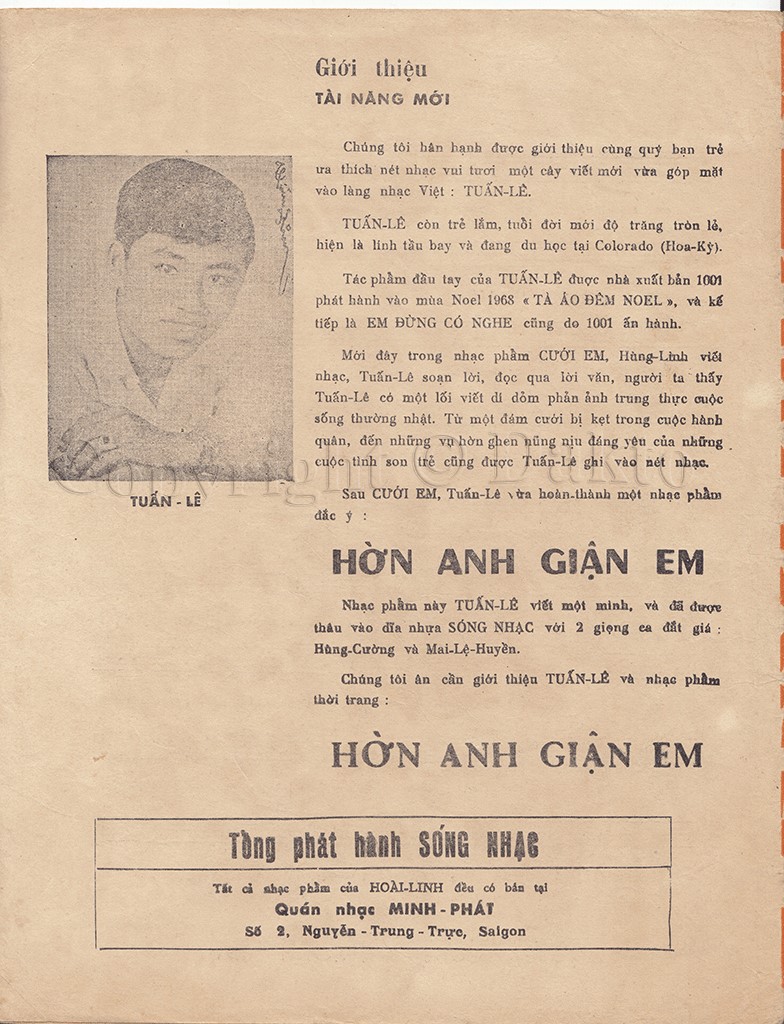
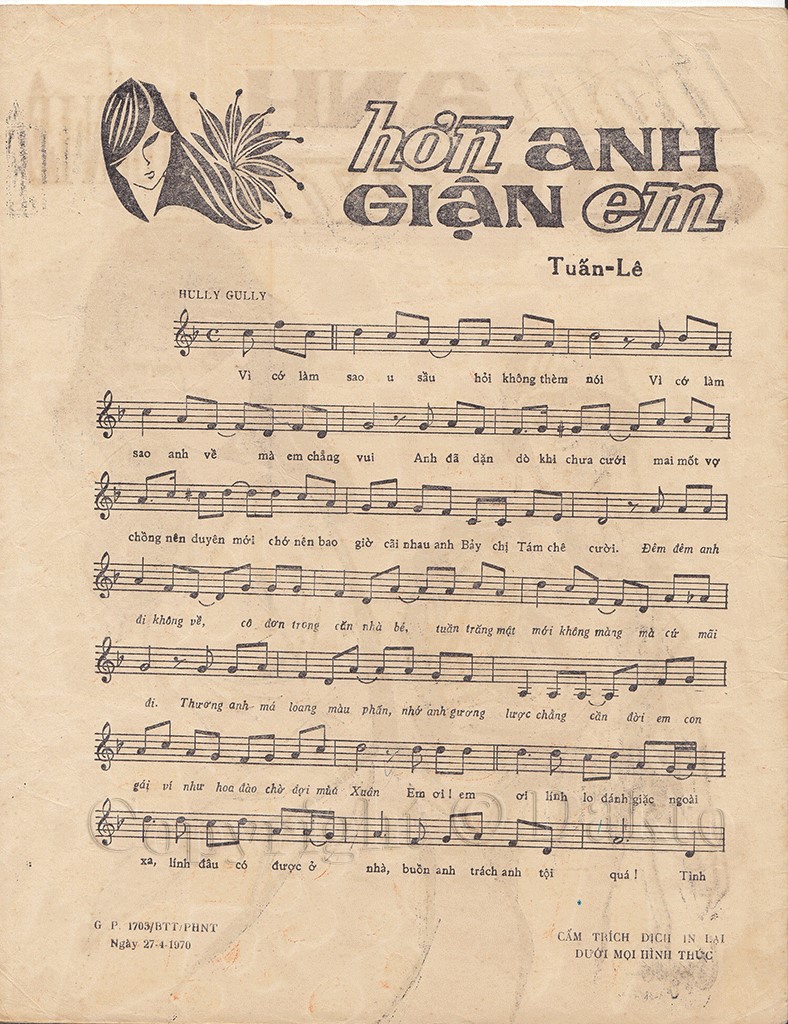
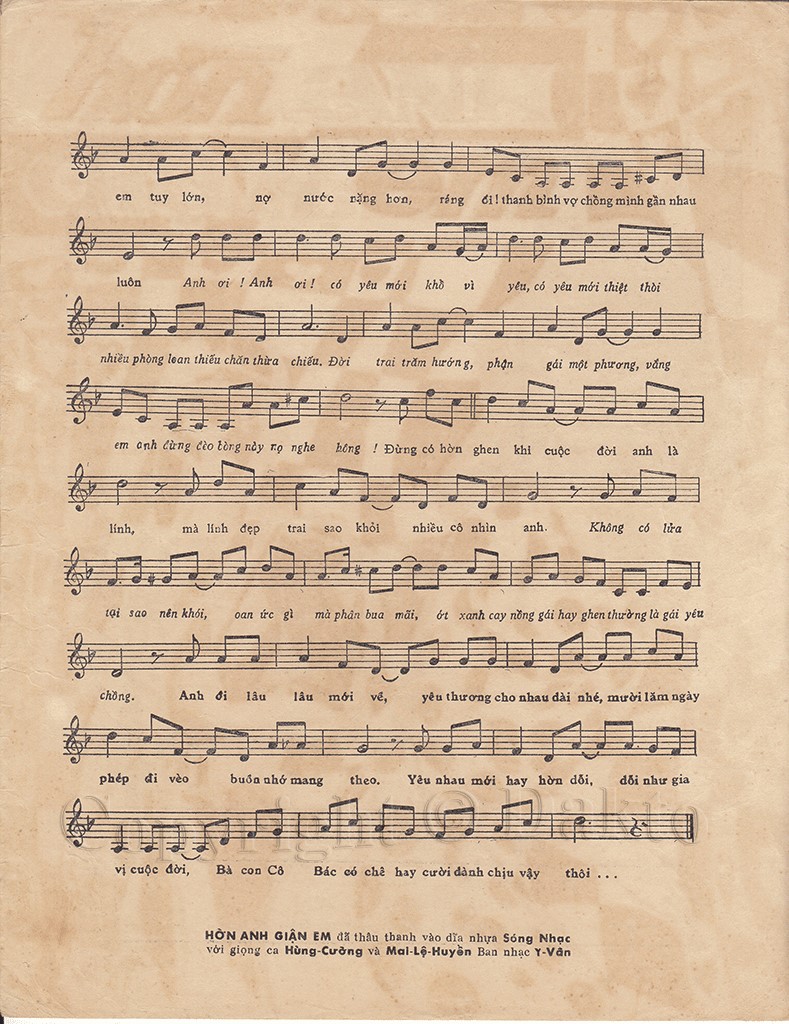
“Mad at Him, Angry at Her” belonged to a musical genre in the RVN known as nhạc lính (“soldiers’ music”). The songs reflected the common sentiments of foot soldiers and often aimed to raise their spirits but did not necessarily praise violence or encourage hatred towards the enemy. Major themes included the hardships of military service, soldiers’ relationship with their loved ones, and the longing for peace. (There is a concise summary of this genre in Vietnamese here.) Some artists who composed and performed “soldiers’ music” were themselves soldiers or performed in the musical troupes of the RVN’s military. In fact, several websites indicate that the songwriter Tuấn Lê was a pilot in the air force of the RVN. “Soldier’s music” was popular not only with soldiers but the general population, especially songs about romantic love like “Mad at Him, Angry at Her.” I like to imagine the narrator(s) in Nguyễn Tranh Trịnh’s What If We Were in Love listening to this song.
The most famous rendition of “Mad at Him, Angry at Her” is by Hùng Cường and Mai Lệ Huyền. Both singers bring their characters to life, and their version is as vivid as a real lovers’ quarrel. Mai Lệ Huyền sings the part of the young wife, who comes off as pouty and jealous but also cute. Hùng Cường sings the part of the husband, who knows exactly how to assuage his wife’s anger but also how to push her buttons. I especially like some of the flourishes that he adds at the end of some lines that are reminiscent of traditional Vietnamese folk music.
I liked “Mad at Him, Angry at Her” so much when I first heard it on Saigon Rock & Soul that I wanted to incorporate it into my teaching. It was the very first song from the CD that I translated, and I used it in my very first lesson in which I had my students listen to music. And my students found the song really catchy! I’ll have to share that lesson plan in some other post, though. Because I was using the song as pedagogical material, I used the recording from the CD as the master version of the original lyrics and the basis of my translation instead of the sheet music so that my translation would match the recording. I’ve designated the husband as “A” and the wife as “B” to help my students follow along. The software I am using does not allow for footnotes on some posts, so they appear below my translation but are not linked.
HỜN ANH GIẬN EM
Nhạc và lời của Tuấn Lê
[A]: Vì cớ làm sao u sầu hỏi không thèm nói
Vì cớ làm sao anh về mà em chẳng vui
Anh đã dặn dò khi chưa cưới
Mai mốt vợ chồng nên duyên mới
Chớ nên bao giờ cãi nhau anh Bảy chị Tám chê cười.
[B]: Ðêm đêm anh đi sau không về
Em cô đơn trong căn nhà bé
Tuần trăng mật mới không màng mà cứ mãi đi
Thương anh má loang màu phấn
Nhớ anh gương lược chẳng cần
Ðời em con gái ví như hoa đào chờ đợi mùa xuân.
[A]: Em ơi! Em ơi! Lính lo đánh giặc ngoài xa
Lính đâu có được ở nhà buồn anh trách anh – tội quá!
Tình em tuy lớn nợ nước anh nặng hơn
Ráng đi! Thanh bình vợ chồng mình gần nhau luôn.
[B]: Anh ơi! Anh ơi! Có yêu mới khổ vì yêu
Có yêu mới thiệt thòi nhiều
Phòng loan thiếu chăn thừa chiếu
Ðời trai trăm hướng phận gái một phương
Vắng em anh đừng đèo bồng này nọ nghe hông!
[A]: (Ui da!) Ðừng có hờn ghen khi cuộc đời anh là lính
Mà lính đẹp trai sao khỏi nhiều cô nhìn anh
[B]: Không có lửa tại sao nên khói oan ức gì mà phân bua mãi
Ớt xanh cay nồng gái hay ghen thường là gái yêu chồng.
[A & B]: Anh đi lâu lâu mới về yêu thương cho nhau dài nhé
Mười lăm ngày phép đi vèo buồn nhớ mang theo
Yêu anh mới hay hờn dỗi dỗi như gia vị cuộc đời
Bà con cô bác có chê hay cười đành chịu vậy thôi.
MAD AT HIM, ANGRY AT HER
Music and lyrics by Tuấn Lê
Original translation by Nu-Anh Tran
[A]: Why are you so sad that you refuse to answer when I speak?
Why are you not happy even though I’m home?
Before we married, I reminded you
That when husband and wife have just wed
They must not quarrel or Seventh Brother and Eighth Sister1 will laugh and ridicule them.
[B]: Night after night you’re gone, why you don’t come home?
I’m all alone in this small house.
A honeymoon – you just don’t care and are always gone!
Loving you, my blush gets runny.
Missing you, I don’t need my brush and mirror.2
My life as a girl is like a plum blossom awaiting the spring.
[A]: My dear! My dear! Soldiers have to fight far away.
Soldiers can’t stay home. Feeling sad and reproaching me – how unfair!
My love for you is large, but my debt to the country is greater.
Try to bear it! When peace comes, we’ll always be together.
[B]: My dear! My dear! Only those who love are miserable because of it.
Only those who love suffer many losses.
The marital bed has a sleeping mat but no blanket.3
A boy’s life has a hundred directions, but a girl’s fate has just one.
You better not take on any extra loads4 when I’m not there, you hear!
[A]: (Ouch!) Don’t get angry and jealous because of my soldier’s life.
And a handsome soldier like me – of course many girls will look!
[B]: If there’s no flame, why is there smoke? What’s the injustice that you keep trying to explain?
Green chili peppers are hot and spicy; a girl who gets jealous is a girl who loves her husband.
[A & B]: You are/I am gone so long and rarely come home, so let’s love each other for a nice long time!
Fifteen days of leave just fly by, and then you/I take the sadness and longing with you/me.
I/You get angry and sulk only because I/you love you/me. Getting angry at each other is the spice of life.
So we just have to put up with it if other people5 laugh or ridicule us.
Notes
1 anh Bảy chị Tám (literally, “Seventh Brother and Eighth Sister”): Colloquial phrase referring to the surrounding community.
2 This line and the previous one follows a convention in classical poetry in which a woman makes herself beautiful only to please her husband or lover and will therefore neglect her appearance when he is absent.
3 thiếu chăn thừa chiếu (“not enough blankets but too many sleeping mats”): Chăn chiếu (“blankets and sleeping mats”) is a classical term referring to conjugal intimacy. Therefore, to have one but not the other implies that a member of the couple is absent.
4 đèo bồng nầy nọ (“take on loads here and there”): Đèo bồng is a colloquial term for romantic involvement. In this case, đèo bồng nầy nọ (“take on loads here and there”) means to form additional romantic relationships outside of the marriage, that is, to be unfaithful.
5 bà con cô bác (literally, “grandmother, child, junior aunt, senior aunt/uncle”): Colloquial phrase meaning “everyone,” especially in reference to the surrounding community.
THE TECHNICAL STUFF
Original sheet music: https://hopamviet.vn/sheet/song/hon-anh-gian-em/W8IUIOCZ.html
The period recording can be found here: https://www.youtube.com/watch?v=41XH0NYc08w
Image credit: https://www.sublimefrequencies.com/products/576864-saigon-rock-soul-vietnamese-classic-tracks-1968-1974

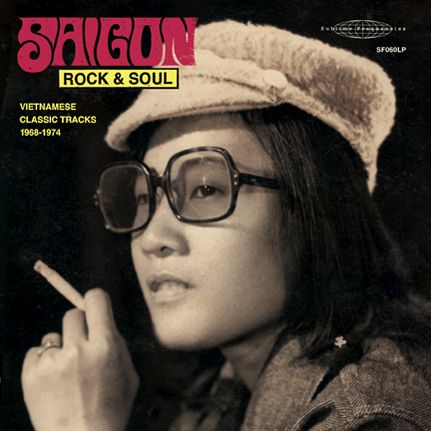
Vì cớ làm sao u sầu hỏi không thèm nói. Thèm makes it a little stronger – Why are you so sad, no desire to speak?
Tuấn Lê is a pseudonym for Hoài Linh – he used his son’s name for the composer credit. Hoài Linh was a northerner, but he employs a very southern vocabulary here.
I would love to hear what Tùng Lâm and Phi Thoàn did with this song:
https://cdnhacviet.blogspot.com/2003/05/dia-hat-song-nhac-1088-tan-nhac-xap-xam.html
Perhaps a better translation would be: “Why are you so sad that you won’t bother answering when I speak?” But that’s a bit long, so I’ve changed it to something shorter.